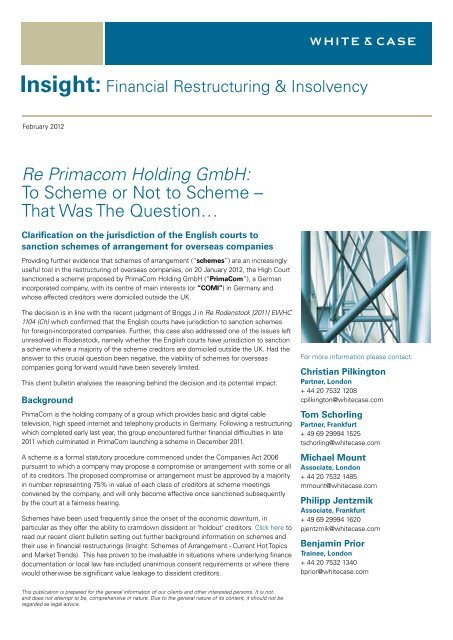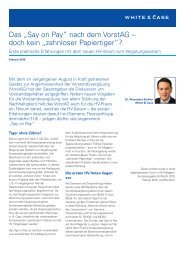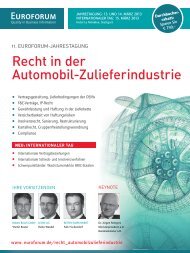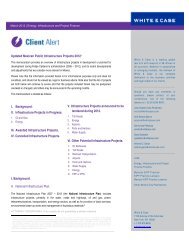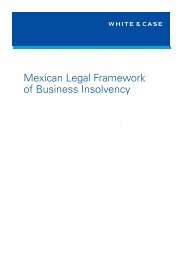Re Primacom Holding GmbH: To Scheme or Not to ... - White & Case
Re Primacom Holding GmbH: To Scheme or Not to ... - White & Case
Re Primacom Holding GmbH: To Scheme or Not to ... - White & Case
Create successful ePaper yourself
Turn your PDF publications into a flip-book with our unique Google optimized e-Paper software.
Insight: Financial <strong>Re</strong>structuring & Insolvency<br />
February 2012<br />
<strong>Re</strong> <strong>Primacom</strong> <strong>Holding</strong> <strong>GmbH</strong>:<br />
<strong>To</strong> <strong>Scheme</strong> <strong>or</strong> <strong>Not</strong> <strong>to</strong> <strong>Scheme</strong> –<br />
That Was The Question…<br />
Clarification on the jurisdiction of the English courts <strong>to</strong><br />
sanction schemes of arrangement f<strong>or</strong> overseas companies<br />
Providing further evidence that schemes of arrangement (“schemes”) are an increasingly<br />
useful <strong>to</strong>ol in the restructuring of overseas companies, on 20 January 2012, the High Court<br />
sanctioned a scheme proposed by PrimaCom <strong>Holding</strong> <strong>GmbH</strong> (“PrimaCom”), a German<br />
inc<strong>or</strong>p<strong>or</strong>ated company, with its centre of main interests (<strong>or</strong> “COMI”) in Germany and<br />
whose affected credit<strong>or</strong>s were domiciled outside the UK.<br />
The decision is in line with the recent judgment of Briggs J in <strong>Re</strong> Rodens<strong>to</strong>ck [2011] EWHC<br />
1104 (Ch) which confirmed that the English courts have jurisdiction <strong>to</strong> sanction schemes<br />
f<strong>or</strong> f<strong>or</strong>eign-inc<strong>or</strong>p<strong>or</strong>ated companies. Further, this case also addressed one of the issues left<br />
unresolved in Rodens<strong>to</strong>ck, namely whether the English courts have jurisdiction <strong>to</strong> sanction<br />
a scheme where a maj<strong>or</strong>ity of the scheme credit<strong>or</strong>s are domiciled outside the UK. Had the<br />
answer <strong>to</strong> this crucial question been negative, the viability of schemes f<strong>or</strong> overseas<br />
companies going f<strong>or</strong>ward would have been severely limited.<br />
This client bulletin analyses the reasoning behind the decision and its potential impact.<br />
Background<br />
PrimaCom is the holding company of a group which provides basic and digital cable<br />
television, high speed internet and telephony products in Germany. Following a restructuring<br />
which completed early last year, the group encountered further financial difficulties in late<br />
2011 which culminated in PrimaCom launching a scheme in December 2011.<br />
A scheme is a f<strong>or</strong>mal statut<strong>or</strong>y procedure commenced under the Companies Act 2006<br />
pursuant <strong>to</strong> which a company may propose a compromise <strong>or</strong> arrangement with some <strong>or</strong> all<br />
of its credit<strong>or</strong>s. The proposed compromise <strong>or</strong> arrangement must be approved by a maj<strong>or</strong>ity<br />
in number representing 75% in value of each class of credit<strong>or</strong>s at scheme meetings<br />
convened by the company, and will only become effective once sanctioned subsequently<br />
by the court at a fairness hearing.<br />
<strong>Scheme</strong>s have been used frequently since the onset of the economic downturn, in<br />
particular as they offer the ability <strong>to</strong> cramdown dissident <strong>or</strong> ‘holdout’ credit<strong>or</strong>s. Click here <strong>to</strong><br />
read our recent client bulletin setting out further background inf<strong>or</strong>mation on schemes and<br />
their use in financial restructurings (Insight: <strong>Scheme</strong>s of Arrangement - Current Hot <strong>To</strong>pics<br />
and Market Trends). This has proven <strong>to</strong> be invaluable in situations where underlying finance<br />
documentation <strong>or</strong> local law has included unanimous consent requirements <strong>or</strong> where there<br />
would otherwise be significant value leakage <strong>to</strong> dissident credit<strong>or</strong>s.<br />
This publication is prepared f<strong>or</strong> the general inf<strong>or</strong>mation of our clients and other interested persons. It is not,<br />
and does not attempt <strong>to</strong> be, comprehensive in nature. Due <strong>to</strong> the general nature of its content, it should not be<br />
regarded as legal advice.<br />
F<strong>or</strong> m<strong>or</strong>e inf<strong>or</strong>mation please contact:<br />
Christian Pilking<strong>to</strong>n<br />
Partner, London<br />
+ 44 20 7532 1208<br />
cpilking<strong>to</strong>n@whitecase.com<br />
<strong>To</strong>m Sch<strong>or</strong>ling<br />
Partner, Frankfurt<br />
+ 49 69 29994 1525<br />
tsch<strong>or</strong>ling@whitecase.com<br />
Michael Mount<br />
Associate, London<br />
+ 44 20 7532 1485<br />
mmount@whitecase.com<br />
Philipp Jentzmik<br />
Associate, Frankfurt<br />
+ 49 69 29994 1620<br />
pjentzmik@whitecase.com<br />
Benjamin Pri<strong>or</strong><br />
Trainee, London<br />
+ 44 20 7532 1340<br />
bpri<strong>or</strong>@whitecase.com
<strong>Re</strong> <strong>Primacom</strong> <strong>Holding</strong> <strong>GmbH</strong>: <strong>To</strong> <strong>Scheme</strong> <strong>or</strong> <strong>Not</strong> <strong>to</strong> <strong>Scheme</strong> –<br />
That Was The Question…<br />
PrimaCom held its scheme credit<strong>or</strong>s’<br />
meetings on 17 January 2012 where<br />
the proposed scheme received the<br />
overwhelming supp<strong>or</strong>t of each class<br />
of scheme credit<strong>or</strong>s.<br />
Two key issues which Hildyard J addressed<br />
in his judgment at the fairness hearing were<br />
whether (i) in practice the scheme would be<br />
effective in the jurisdiction where<br />
PrimaCom had its centre of main interests<br />
(i.e. Germany) in <strong>or</strong>der <strong>to</strong> bind the dissident<br />
credit<strong>or</strong>, and (ii) the court had jurisdiction <strong>to</strong><br />
sanction the scheme notwithstanding the<br />
fact that all of the affected credit<strong>or</strong>s were<br />
domiciled outside the UK.<br />
(i) Effectiveness<br />
The question of whether a UK scheme<br />
would be effective overseas was brought<br />
in<strong>to</strong> focus as a result of the decision of the<br />
German Higher <strong>Re</strong>gional Court not <strong>to</strong><br />
recognise the scheme relating <strong>to</strong> Equitable<br />
Life in 2010 (Oberlandesgericht Celle (ref:<br />
8U46/09)). The rationale f<strong>or</strong> the German<br />
Court’s decision in that case was, firstly,<br />
that schemes are not recognised under the<br />
EC <strong>Re</strong>gulation on Insolvency Proceedings<br />
1346/2000 as they are not confined solely<br />
<strong>to</strong> insolvent companies and, secondly, a<br />
scheme does not constitute a ‘judgment’<br />
which could be given au<strong>to</strong>matic effect<br />
under Council <strong>Re</strong>gulation 44/2001 on<br />
Jurisdiction and the <strong>Re</strong>cognition of<br />
Enf<strong>or</strong>cement of Judgments in Civil and<br />
Commercial Matters (the “Judgments<br />
<strong>Re</strong>gulation”) as it lacks the requisite<br />
‘dispute element’ due <strong>to</strong> the maj<strong>or</strong>ity<br />
supp<strong>or</strong>t of the scheme from credit<strong>or</strong>s.<br />
Following the reasoning of Briggs J in<br />
<strong>Re</strong> Rodens<strong>to</strong>ck, Hildyard J held that the<br />
Oberlandesgericht Celle case could be<br />
distinguished on the basis that, amongst<br />
other things, that case had involved the<br />
compromise of German law-governed<br />
claims whereas the <strong>Re</strong> PrimaCom case<br />
involved claims arising under contracts<br />
governed exclusively by English law. As a<br />
result, even if the <strong>or</strong>der (sanctioning the<br />
scheme) was not a judgment f<strong>or</strong> the<br />
purposes of the Judgments <strong>Re</strong>gulation, the<br />
amendments effected by the scheme<br />
2<br />
would be legally effective in Germany<br />
because the German courts would,<br />
pursuant <strong>to</strong> private international law rules,<br />
apply English law <strong>to</strong> the question of<br />
whether the credit<strong>or</strong>s’ rights against<br />
PrimaCom had been varied by the scheme.<br />
As such, Hildyard J considered there <strong>to</strong> be a<br />
reasonable, if not better, prospect of the<br />
German courts recognising and giving<br />
effect <strong>to</strong> the scheme<br />
(ii) Jurisdiction <strong>to</strong> Sanction the<br />
<strong>Scheme</strong>: Domicile of Credit<strong>or</strong>s<br />
At the fairness hearing in relation <strong>to</strong> the<br />
scheme of PrimaCom, Hildyard J was<br />
required <strong>to</strong> consider whether the<br />
Judgments <strong>Re</strong>gulation fettered his<br />
jurisdiction <strong>to</strong> sanction the scheme<br />
proposed by PrimaCom. This resulted from<br />
an extract of the judgment of Briggs J in<br />
<strong>Re</strong> Rodens<strong>to</strong>ck where he focussed on the<br />
“conundrum” posed by Article 2 of the<br />
Judgments <strong>Re</strong>gulation which requires that<br />
a defendant be “sued” in the member state<br />
in which they are domiciled in <strong>or</strong>der <strong>to</strong><br />
attain jurisdiction. Briggs J considered this<br />
provision ill-equipped <strong>to</strong> deal with schemes<br />
(which are not aimed at specific<br />
defendants), and noted a potential lacuna<br />
where a scheme is caught within the scope<br />
of the Judgments <strong>Re</strong>gulation but where<br />
there is no clear basis f<strong>or</strong> the allocation of a<br />
member state’s international jurisdiction.<br />
On the facts of <strong>Re</strong> Rodens<strong>to</strong>ck, Briggs J<br />
concluded that as over 50% (by value) of<br />
the scheme credit<strong>or</strong>s were domiciled in<br />
England, the English court would have<br />
jurisdiction notwithstanding the conundrum.<br />
He went on <strong>to</strong> say that he would “leave <strong>to</strong><br />
another day a case in which a scheme is<br />
sought <strong>to</strong> be sanctioned in England where<br />
all the affected members <strong>or</strong> credit<strong>or</strong>s are<br />
domiciled in member states other than the<br />
UK.” PrimaCom was such a case, as<br />
evidence was put bef<strong>or</strong>e the court<br />
confirming that none of the scheme<br />
credit<strong>or</strong>s was inc<strong>or</strong>p<strong>or</strong>ated in the UK.<br />
At the fairness hearing in relation <strong>to</strong><br />
PrimaCom, Hildyard J paid particular focus<br />
<strong>to</strong> the “conundrum” found in Article 2 of<br />
the Judgments <strong>Re</strong>gulation described above,<br />
but nevertheless held that the Court had<br />
jurisdiction <strong>to</strong> sanction the scheme on one<br />
<strong>or</strong> m<strong>or</strong>e of the following basis:<br />
1 As a scheme was not a conventional<br />
f<strong>or</strong>m of adversarial proceedings, there<br />
was no ‘Defendant’ in the matter and,<br />
theref<strong>or</strong>e, Article 2 of the Judgments<br />
<strong>Re</strong>gulation did not apply <strong>to</strong> the question<br />
of recognition under the Judgments<br />
<strong>Re</strong>gulation;<br />
2 <strong>Scheme</strong> credit<strong>or</strong>s had agreed that the<br />
English courts should have jurisdiction by<br />
submitting <strong>to</strong> the exclusive jurisdiction of<br />
the English courts under each of the key<br />
finance documents (and so fell within<br />
Article 23 of the Judgments <strong>Re</strong>gulation<br />
f<strong>or</strong> the scheme <strong>to</strong> be recognised);<br />
3. Further, <strong>Scheme</strong> credit<strong>or</strong>s had impliedly<br />
submitted <strong>to</strong> the jurisdiction of the<br />
English courts through their appearance<br />
at the directions hearing <strong>to</strong> consider the<br />
convening of the scheme credit<strong>or</strong>s<br />
meetings (and so fell within Article 24 of<br />
the Judgments <strong>Re</strong>gulation f<strong>or</strong> the<br />
scheme <strong>to</strong> be recognised); and/<strong>or</strong><br />
4 By analogy with Article 4 of the<br />
Judgments <strong>Re</strong>gulation (which addresses<br />
another potential lacuna in relation <strong>to</strong><br />
recognition, namely where defendants<br />
are not domiciled in a member state),<br />
each member state could continue <strong>to</strong><br />
apply its own private international law in<br />
<strong>or</strong>der <strong>to</strong> recognise the scheme.<br />
In summary, in sanctioning the scheme,<br />
Hildyard J found that the Judgments<br />
<strong>Re</strong>gulation was not an obstacle <strong>to</strong> the<br />
English Court having jurisdiction <strong>to</strong> sanction<br />
the scheme of PrimaCom, notwithstanding<br />
that all of its credit<strong>or</strong>s were domiciled<br />
overseas. He expressed his preference f<strong>or</strong><br />
the first of the above routes as the basis f<strong>or</strong><br />
jurisdiction, observing that a scheme is<br />
“simply not within the purview of Article 2”<br />
and that it would be a “stretch” <strong>to</strong> consider<br />
any of the parties <strong>to</strong> be ‘Defendants’. He also<br />
found routes 2 and 3 <strong>to</strong> be viable methods<br />
f<strong>or</strong> the recognition of schemes overseas,<br />
whilst leaving open whether route 4 could be<br />
used as an alternative base of recognition.
<strong>White</strong> & <strong>Case</strong> LLP<br />
5 Old Broad Street<br />
London EC2N 1DW<br />
Tel: + 44 20 7532 1000<br />
Fax: + 44 20 7532 1001<br />
Conclusion<br />
PrimaCom joins a growing list of f<strong>or</strong>eign<br />
companies (including Wind Hellas, Gallery<br />
Media, Rodens<strong>to</strong>ck, Tele Columbus, La<br />
Seda and Metrovacesa) which have taken<br />
advantage of schemes <strong>to</strong> effect their<br />
restructurings since the onset of the<br />
economic downturn.<br />
If the Court in PrimaCom had ruled that it<br />
did not have jurisdiction <strong>to</strong> sanction a<br />
scheme where a maj<strong>or</strong>ity <strong>or</strong> all of the<br />
affected credit<strong>or</strong>s were domiciled outside<br />
of the UK, the result would have been that<br />
schemes would be unavailable as a<br />
restructuring <strong>to</strong>ol f<strong>or</strong> most large, crossb<strong>or</strong>der<br />
restructurings of overseas entities.<br />
In this publication, <strong>White</strong> & <strong>Case</strong> means the international legal practice comprising <strong>White</strong> & <strong>Case</strong> LLP, a New Y<strong>or</strong>k State registered limited liability partnership,<br />
<strong>White</strong> & <strong>Case</strong> LLP, a limited liability partnership inc<strong>or</strong>p<strong>or</strong>ated under English law and all other affiliated partnerships, companies and entities.<br />
LON0212007_1<br />
whitecase.com<br />
The decision in PrimaCom, however,<br />
emphasises the wide ambit of the Court <strong>to</strong><br />
allow jurisdiction f<strong>or</strong> schemes of overseas<br />
entities so that they will likely continue <strong>to</strong><br />
be the predominant process of choice f<strong>or</strong><br />
complex restructurings going f<strong>or</strong>ward.<br />
PrimaCom <strong>Holding</strong> <strong>GmbH</strong> was represented<br />
by <strong>White</strong> & <strong>Case</strong> and David Allison of<br />
3-4 South Square Chambers at<br />
the High Court


